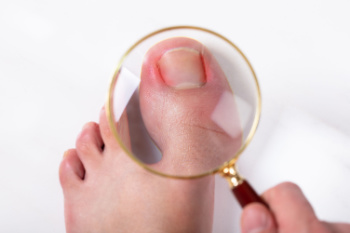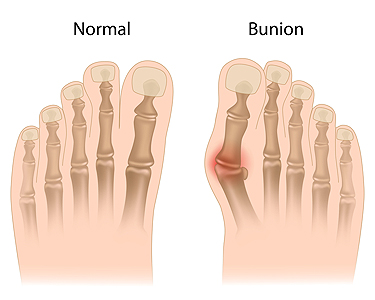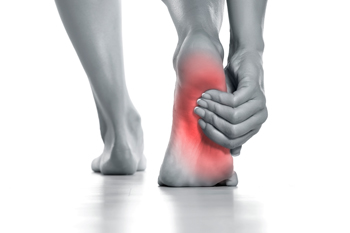Dallas (214) 340-8885
Athens (903) 677-9090
Gun Barrel City (903) 887-4341
Dallas (214) 340-8885
Athens (903) 677-9090
Gun Barrel City (903) 887-4341

Ingrown toenails develop when the edges or corners of a toenail grow into the surrounding skin, causing pain, redness, and swelling. The condition can happen on either the side, tip or even the base of the toenail. Common causes include improper nail trimming, tight shoes, or injury to the toe. In some cases, genetics or fungal infections can contribute to the development of ingrown toenails. Symptoms include localized pain, swelling, and sometimes pus or drainage if an infection sets in. The affected toe may appear red or tender, and pressure from shoes can increase the pain. Left untreated, ingrown toenails can lead to more serious complications, such as infection or permanent nail damage. A podiatrist can provide effective treatments for ingrown toenails, including trimming or removing the nail, draining any infection, and prescribing antibiotics if necessary. In chronic cases, they may perform a minor procedure to prevent the nail from growing back incorrectly. If you are dealing with an ingrown toenail, it is suggested that you make an appointment with a podiatrist for care.
Ingrown toenails may initially present themselves as a minor discomfort, but they may progress into an infection in the skin without proper treatment. For more information about ingrown toenails, contact Dr. Jonathan Kletz of Texas Foot Works. Our doctor can provide the care you need to keep you pain-free and on your feet.
Ingrown Toenails
Ingrown toenails are caused when the corner or side of a toenail grows into the soft flesh surrounding it. They often result in redness, swelling, pain, and in some cases, infection. This condition typically affects the big toe and may recur if it is not treated properly.
Causes
You are more likely to develop an ingrown toenail if you are obese, have diabetes, arthritis, or have any fungal infection in your nails. Additionally, people who have foot or toe deformities are at a higher risk of developing an ingrown toenail.
Symptoms
Some symptoms of ingrown toenails are redness, swelling, and pain. In rare cases, there may be a yellowish drainage coming from the nail.
Treatment
Ignoring an ingrown toenail can have serious complications. Infections of the nail border can progress to a deeper soft-tissue infection, which can then turn into a bone infection. You should always speak with your podiatrist if you suspect you have an ingrown toenail, especially if you have diabetes or poor circulation.
If you have any questions, please feel free to contact one of our our offices located in Dallas, Athens, and Gun Barrel City, TX . We offer the newest diagnostic and treatment technologies for all your foot care needs.

Bunions can cause pain, stiffness, and swelling near the big toe joint. While bunions do not go away on their own, gentle exercises may help reduce discomfort, improve flexibility, and slow their progression. One helpful move is the toe stretch where you simply pull the big toe gently into alignment and hold for several seconds. Another is the towel scrunch. This involves placing a towel flat on the floor and using your toes to scrunch it toward you, which can strengthen the foot muscles. Try toe spreading by placing small spacers or your fingers between your toes and holding for a short time. Additionally, rolling a ball under your foot can also ease tension. These exercises should be done daily and combined with supportive shoes and foot care. If you have bunion pain, it is suggested that you see a podiatrist for appropriate treatment.
If you are suffering from bunions, contact Dr. Jonathan Kletz of Texas Foot Works. Our doctor can provide the care you need to keep you pain-free and on your feet.
What Is a Bunion?
A bunion is formed of swollen tissue or an enlargement of boney growth, usually located at the base joint of the toe that connects to the foot. The swelling occurs due to the bones in the big toe shifting inward, which impacts the other toes of the foot. This causes the area around the base of the big toe to become inflamed and painful.
Why Do Bunions Form?
Genetics – Susceptibility to bunions are often hereditary
Stress on the feet – Poorly fitted and uncomfortable footwear that places stress on feet, such as heels, can worsen existing bunions
How Are Bunions Diagnosed?
Doctors often perform two tests – blood tests and x-rays – when trying to diagnose bunions, especially in the early stages of development. Blood tests help determine if the foot pain is being caused by something else, such as arthritis, while x-rays provide a clear picture of your bone structure to your doctor.
How Are Bunions Treated?
If you have any questions, please feel free to contact one of our our offices located in Dallas, Athens, and Gun Barrel City, TX . We offer the newest diagnostic and treatment technologies for all your foot care needs.

Foot pain is not just an adult problem. Children and adolescents often experience discomfort in their feet, which can affect their ability to participate in sports, play, and daily activities. Growth spurts, flat feet, and overuse injuries are common causes. Conditions like Sever’s disease, which involves inflammation at the growth plate in the heel, frequently occur during periods of rapid growth. Wearing improper footwear can also lead to pain, especially if shoes do not provide enough support or cushioning. Ignoring foot pain in young people may result in long-term issues, including changes in walking patterns and posture. Early evaluation and treatment can make a big difference in restoring comfort and preventing more serious problems later. If your child frequently complains of foot pain or you notice limping, it is suggested that you see a podiatrist for a proper diagnosis and treatment tailored to their growing feet.
Foot Pain
Foot pain can be extremely painful and debilitating. If you have a foot pain, consult with Dr. Jonathan Kletz from Texas Foot Works. Our doctor will assess your condition and provide you with quality foot and ankle treatment.
Causes
Foot pain is a very broad condition that could be caused by one or more ailments. The most common include:
Diagnosis
To figure out the cause of foot pain, podiatrists utilize several different methods. This can range from simple visual inspections and sensation tests to X-rays and MRI scans. Prior medical history, family medical history, and any recent physical traumatic events will all be taken into consideration for a proper diagnosis.
Treatment
Treatment depends upon the cause of the foot pain. Whether it is resting, staying off the foot, or having surgery; podiatrists have a number of treatment options available for foot pain.
If you have any questions, please feel free to contact one of our our offices located in Dallas, Athens, and Gun Barrel City, TX . We offer the newest diagnostic and treatment technologies for all your foot care needs.